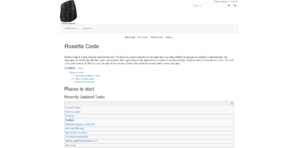Rosetta Code facts for kids

Front page of rosettacode.org
|
|
| Available in | English |
|---|---|
| Owner | Mike Mol |
| Launched | January 1, 2007 |
| Current status | Online |
|
Content license
|
GFDL |
| Written in | PHP, MediaWiki |
Rosetta Code is a special website that helps people learn about computer programming. It's like a big online library where you can find different ways to solve computer problems. You can see how these problems are solved using many different programming languages.
Contents
About Rosetta Code
Rosetta Code was started in 2007 by Michael Mol. The website's content is free to use and share under a special license called the GNU Free Documentation License. This means many people can use and learn from the code examples.
The site is a huge collection of code examples. It shows how to do the same task in many different programming languages. This helps you see how each language works and how they are similar or different.
As of September 25, 2019, Rosetta Code had:
- 971 computer problems to solve
- 225 extra problem ideas being worked on
- 723 different programming languages
- 66,679 examples of code in those languages
How Rosetta Code Works
The Rosetta Code website is set up so you can easily explore it. You can look for specific programming problems or for different programming languages.
Each problem has its own page. On this page, you can see solutions that people have shared in various programming languages. This makes it easy to compare how different languages solve the same problem.
Also, each programming language has its own page. This page lists all the problems that have solutions written in that language. For example, if a problem has a solution in the C language, it will be listed on the C language page. If the same problem also has a solution in Ruby, it will be on the Ruby page too.
Programming Languages You Can Find
Rosetta Code includes many popular programming languages. Here are just a few of them:
- Ada
- ALGOL 60
- ALGOL 68
- ALGOL W
- APL
- AWK
- AutoHotKey
- BASIC (with 40 different versions!)
- C
- C Sharp (C#)
- C++
- Clojure
- COBOL
- Common Lisp
- D
- Erlang
- F Sharp (F#)
- Factor
- Forth
- Fortran
- Elixir
- Go
- Groovy (Apache Groovy)
- Haskell
- Icon
- J
- Java
- JavaScript
- Julia
- Kotlin
- Maple
- Mathematica
- MATLAB
- Nim
- OCaml
- Octave
- PARI/GP
- Pascal
- Perl
- PHP
- Picolisp
- PL/I
- PowerShell
- PureBasic
- Python
- R
- Racket
- Raku
- REXX
- Ruby
- Rust
- Scala
- Scheme
- Seed7
- SequenceL
- Swift
- Tcl
- Unicon
- XPL0
You can find a full list of all programming languages with solutions on Rosetta Code.
Types of Tasks You Can Find
Rosetta Code has many different kinds of programming tasks. Some are about math, some are about games, and others are about making patterns. Here are some examples:
- "99 Bottles of Beer" (a classic song task)
- Abbreviations
- Ackermann function (a complex math function)
- Amicable numbers
- Anagrams (words made by rearranging letters)
- Bernoulli numbers
- Bitwise operations (working with individual bits of data)
- Cholesky decomposition
- Combinations
- Comments (notes in code)
- Continued fractions
- Cyclic redundancy check (CRC-32)
- de Bruijn sequence
- Death Star (how to draw it)
- Dot product
- Dragon curve (a fractal shape)
- Egyptian fractions
- Eight queens puzzle (a chess puzzle)
- Factorials
- Fibonacci sequence (a number pattern)
- FizzBuzz (a common coding challenge)
- Galton box (bean box) animation
- Gamma function
- Gaussian elimination
- Greatest common divisor (GCD)
- Hello world program Hello world/Text (a very first program)
- Hofstadter Q sequence
- Infinity
- Least common multiple (LCM)
- Leonardo numbers
- Levenshtein distance
- Look-and-say sequence
- Lucas numbers
- Lucas-Lehmer primality test
- Mandelbrot set (how to draw it)
- Mersenne primes
- Miller-Rabin primality test
- Morse code
- Numerical integration
- Pascal's triangle (how to draw it)
- Perfect numbers
- Permutations
- Prime numbers
- Primorial numbers
- Quaternions
- Quine (a program that prints its own code)
- Random numbers
- Rock-paper-scissors (how to play it)
- Roman numerals (how to change them to numbers and back)
- Roots of unity
- roots of a function
- Rot13 (a simple secret code)
- Runge–Kutta method
- SEDOLs
- Semiprimes
- Sierpinski triangle (how to draw it)
- Sorting algorithms (ways to put things in order)
- Square-free integers
- Statistics
- Stem-and-leaf display
- Function definition (how to make a block of code)
- Sudoku (how to solve it)
- Taxicab numbers
- Thue-Morse sequence
- Tic-tac-toe (noughts and crosses)
- Tower of Hanoi (how to solve the puzzle)
- Trigonometric functions
- Ulam spiral (how to draw it)
- Vampire numbers
- Xiaolin Wu's line algorithm (how to draw lines smoothly)
- Zebra Puzzle or Einstein riddle
- Zeckendorf representation
See also
 In Spanish: Rosetta Code para niños
In Spanish: Rosetta Code para niños
 | Audre Lorde |
 | John Berry Meachum |
 | Ferdinand Lee Barnett |

